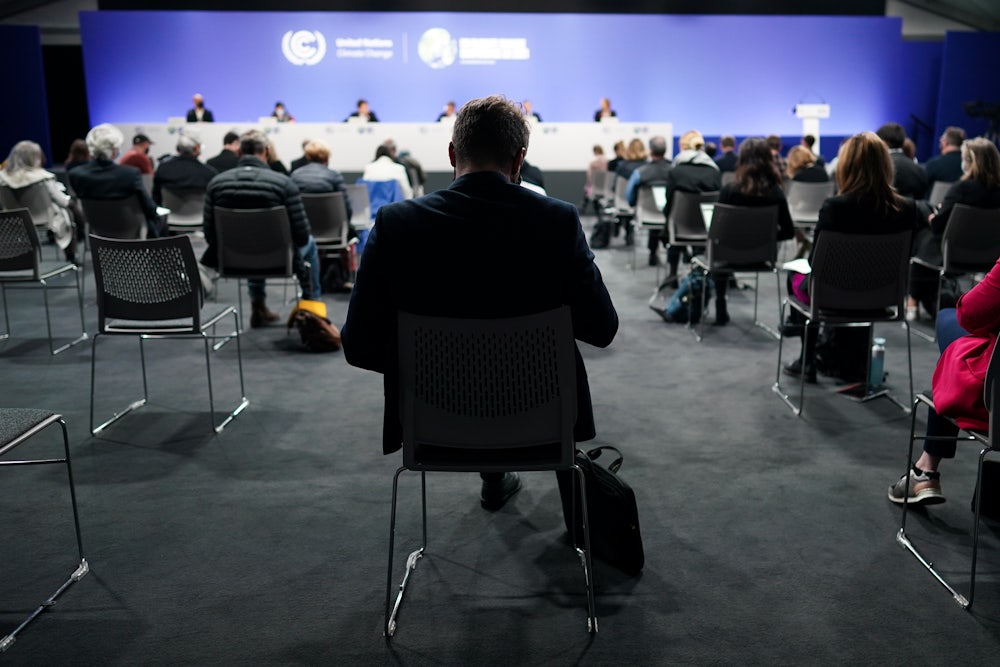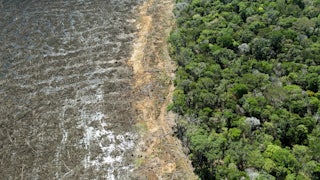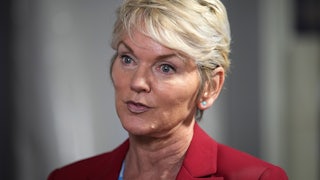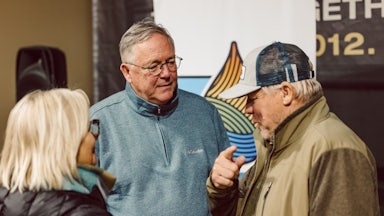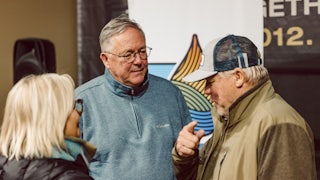Wandering through the U.N. climate talks in Glasgow, Scotland, the uninitiated might be surprised by just how much of it looks like a trade show. Far removed from the rooms where actual negotiations are happening, flashy pavilions mounted by countries, corporations, and trade associations hand out free coffee and snacks to passers-by—and tell them celebratory stories about their efforts to reduce carbon emissions. Speaking at an event last week at the International Emissions Trading Association, or IETA, pavilion, current and former BP executives had something on their minds other than a free lunch: bad press.
They were gathered to discuss the voluntary carbon market, the system that underpins the rash of “net-zero” commitments that companies and governments have released in the last year. The theory is pretty simple: Polluters buy up emissions reductions elsewhere—known as carbon credits—to balance out their own emissions at home, whether now or in the future. This might mean planting new trees, purchasing swathes of land to keep them from being logged, or building a solar project. The trouble is whether those are actually new emissions reductions or painting green a business model that hasn’t fundamentally changed. An analysis by the nonprofit ActionAid, for instance, has found that Royal Dutch Shell’s net-zero commitment entails a land area to plant trees that would be three times the size of The Netherlands. Needless to say those trees haven’t been planted, and the path to doing so is neither clear nor uncomplicated.
Investigative reporting from Bloomberg, ProPublica, and The Guardian, among others, has cast doubt on the integrity of the products being traded in carbon markets, showing that certain credits are actually adding to greenhouse gas emissions rather than subtracting from them or balancing them out. For instance, ProPublica and the think tank Carbon Plan found that through accounting tricks, and by packaging tracts of land that didn’t need to be protected, California’s carbon-offset program had greenlit emissions equivalent to putting 8.5 million cars on the road. Such revelations place corporate net-zero commitments in a vulnerable spot. If their credits really are “meaningless,” as Bloomberg has noted, then companies will have to ramp down emissions much more quickly.
That tension was in the room at the IETA panel last week. “As this market scales up, the attacks will come even more so from the Greenpeaces, Guardian,” said attendee Ed Hewitt, who used to work at BP and now is the managing director of “natural climate solutions” for Respira, a company that looks to enlist capital markets in carbon-offset markets and conservation efforts. “I used to love The Guardian, but it’s a powerful source of spreading a certain agenda. I genuinely think it’s the biggest risk to our sector, because once people … if there’s more reputational risk associated with buying carbon credits for [corporations] instead of good news for doing it, then no one’s going to do it, and the whole thing’s going to go pop.”
“As soon as one bad article comes,” BP climate director Jeff Swartz said in response to Hewitt, “everybody who was skeptical of offsets says, ‘Oop, there they go again. I knew it all along.’ I think we all feel that. And it’s like, we need to cut through and say one article critical of the offset market—which I’m sure is a very well-written article—doesn’t mean every single type of offset is bad, and the whole system is bad.”
Panel moderator Andrea Abrahams, managing director of the International Carbon Reduction and Offset Alliance, who worked at BP for 10 years before leaving in December 2020, chimed in. Such coverage, she said, “runs a real risk of grabbing the press and the headlines and changing opinion.”
Swartz and Abrahams have plenty of company at COP26. There are more delegates from the fossil fuel industry than from any country. According to an analysis of the COP26 attendance list by the nonprofit Global Witness, 503 badges have been issued to attendees with links to fossil fuel companies.
“Instead of really transforming to cut emission, most of these net-zero pledges contain massive amounts of carbon offsetting, which means corporations can carry on with business as usual and claiming that they are carbon neutral,” ActionAid climate policy coordinator Teresa Anderson told me in Glasgow.* “There isn’t enough land on the planet to meet all of the carbon-offsetting targets announced by these thousands of companies. But there is desperation.”
Abrahams had spoken earlier about the challenges posed by critical news coverage. “The risk of acting and being criticized for not following somebody’s view of the rules is so high,” Abrahams said. “Especially when you’re a large company and falling within the large emitter category. So this is really problematic, and you’ve seen a lot of this.” She explicitly referenced coverage of “carbon-neutral” liquefied natural gas, which fossil fuel companies have flocked to in recent years. BP has been developing its own allegedly carbon-neutral LNG offset project in its Asia-Pacific region. “I would argue,” said Abrahams, “that there’s probably a number of those emissions” from carbon-neutral LNG, highlighted by reporters “that have been according to what are the rules of the road right now. Yet it’s raised a lot of criticism, and nobody wants that, especially when you’re trying so hard to do the right thing.”
The scrutiny reporters have applied to carbon offsetting comes at a sensitive time for major polluters. As their social license to operate as major oil and gas producers has waned, many have leaned on investments in clean energy or carbon offsetting as a means of cleaning up their image. To hear panelists tell it, a similar threat to what they face on fossil fuels now faces their plan to keep them going: They don’t want offset systems to lose their social license to operate, and they don’t want the public to turn against offsets. The sheer number of net-zero commitments that have been announced in the last year, moreover, heralds a vast expansion of offset markets, at a time when the ability of such projects to help reduce emissions faces additional scrutiny.
Swartz, at the IETA event, compared the growth of carbon offsets to—of all things—a pyramid. “We’re building a pyramid,” he said, “but we’re still trying to cover the stones. So we know that it’s coming, and we need it. But we just want to make sure that it looks good after you’ve built it, and while we’re building it, too.” What carbon offsets actually look like, in other words, remains subject to Wild West standards and regulations. But corporations are planning to grow demand for them as fast as they can in any case.
* This article originally misstated Teresa Anderson’s title.
